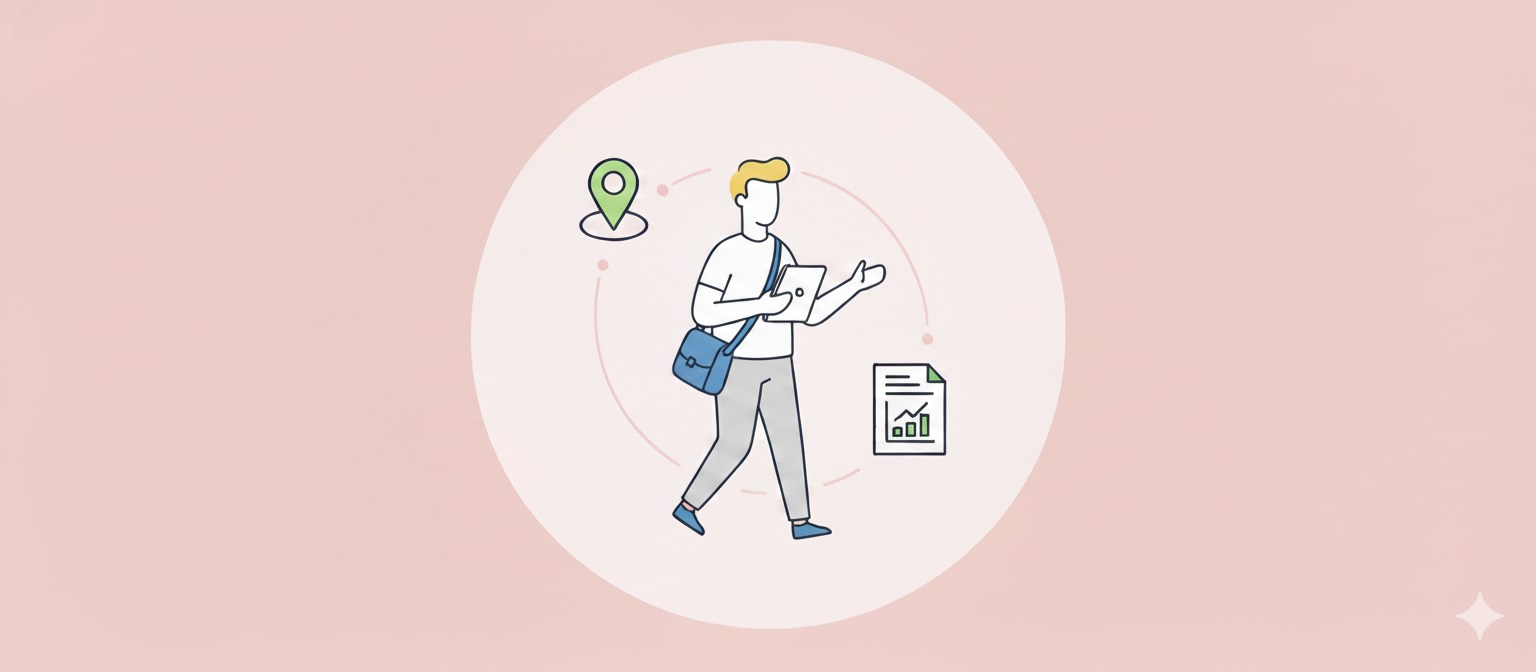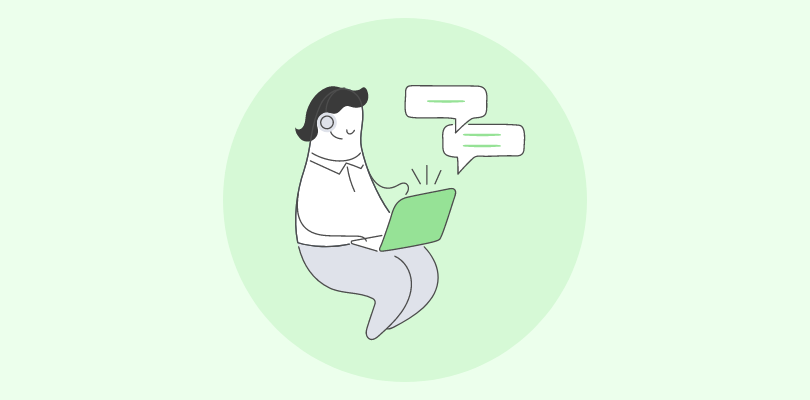“The key is to set realistic customer expectations and then not just to meet them, but to exceed them – preferably in unexpected and helpful ways.” – Richard Branson
In the nonprofit world, this rings especially true. You’re not just dealing with “customers,” but with donors, volunteers, and beneficiaries – individuals who are passionate about your cause and invest their time, money, and trust in your organization.
This is where a CRM for nonprofits can help you manage a mountain of donor data, personalize communications, and keep track of volunteer contributions.
In this blog, I’ll share the top 10 CRM for nonprofits to consider. Read on to discover the solutions that best align with your nonprofit’s goals so you can devote more time to your mission instead of administrative tasks.
What Is a CRM for Nonprofits?
A nonprofit CRM (Customer Relationship Management) system is software designed specifically to help nonprofit organizations build and manage relationships with supporters—including donors, volunteers, sponsors, and grant makers.
Unlike sales-focused CRMs, CRM software for nonprofits includes features like donation tracking, campaign automation, event registration, grant management, volunteer scheduling, and nonprofit payment processing. With donor data and fundraising analytics in one place, nonprofits can make informed decisions, deliver personalized outreach, and drive better engagement.
Quick Overview: My Top 3 Best CRMs for Nonprofits
In a hurry? Here are my top 3 CRM recommendations that you can check instantly.
1. BIGContacts
BIGContacts is perfect for small nonprofits needing a simple yet powerful CRM. It offers contact management, drip email automation, and donation tracking with an easy-to-use dashboard. The free plan suits budget-conscious teams, while paid plans add more features.
2. DonorPerfect
DonorPerfect helps nonprofits manage recurring gifts, pledges, and event participation with ease. It’s built-in email marketing and reporting tools streamline fundraising and improve outreach. Integration with tools like Constant Contact and QuickBooks enhances functionality. While the platform’s interface feels dated and customization is limited, its campaign-specific features make it a go-to for focused fundraising efforts.
3. Keela
Keela offers nonprofits intelligent donor insights, automated communications, and grant tracking features—all in one platform. It’s ideal for teams managing multiple campaigns and looking to boost collaboration and fundraising impact. Keela’s intuitive design and performance analytics stand out, though some advanced tools require premium plans. Still, it’s a smart, scalable solution for data-driven nonprofits.
List of Top 10 CRMs for Nonprofits
In this blog, I’ll share the top CRM for nonprofit organizations. Read on to discover the solutions that best align with your nonprofit’s goals so you can devote more time to your missions instead of administrative tasks.
| Software | Best For | Pricing |
|---|---|---|
| BIGContacts | Contact Management & Email Marketing for Small & Medium Businesses | Forever free for small teams. Paid plan starts at $9.99/month |
| Salesforce | Large & Complex Sales Organizations | Starts at $25/user/month |
| DonorPerfect | Fundraising Campaign Management | Custom pricing |
| Donorbox CRM | All-in-One Donor Management | Starts at $139/user/month |
| Bloomerang | Donor Retention | Starts at $25/user/month |
| EngageBay | Lead Generation & Marketing Automation | Starts at $12.70/user/month |
| Blackbaud CRM | Enterprise-Scale Fundraising & Stewardship | Custom pricing |
| Neon CRM | Supporter & Membership Management | Starts at $99/user/month |
| Keela | AI-Driven Fundraising & Grant Tracking | Custom pricing |
| GiveButter | Online Fundraising Campaigns | Starts at $29/user/month |
1. BIGContacts – Best for Contact Management & Email Marketing for Startups & Small & Medium Businesses
BIGContacts CRM intelligently meets the needs of smaller teams, providing a system that is not overwhelming yet suitably comprehensive.
It delivers an array of features to manage contacts effectively, thus keeping you connected with all stakeholders, be it donors, volunteers, or beneficiaries.
In my opinion, this is one of the strongest CRM contenders for nonprofits to track communication history, send email campaigns on a personalized level, and automate tasks and reminders to avoid missing out on critical actions.
This nonprofit CRM software is also pocket-friendly, with a forever-free plan for small teams.
Here’s what Sennen Quigley, Manager at The Foundation for Financial Education, says about BIGContacts:
Pros:
- Powerful contact management that includes segmented contact lists, custom data fields, tags, communication tracking, social media integration, and more
- Sales pipeline management and automated drip email marketing feature to enhance engagement
- Smart reports and analytics to assess team performance and campaign effectiveness
- Intuitive task management that uses a simple drag-and-drop setup to organize tasks seamlessly
- Awesome human support 24/7 via phone, chat, and knowledge base
- The interface is user-friendly and helps in navigating easily
Cons:
- No downloadable or on-premise version
- No dedicated account manager for the free plan, unlike the paid
Pricing:
Forever free for small teams. Paid starts at $9.99/month.
2. Salesforce – Best for Large & Complex Sales Organizations
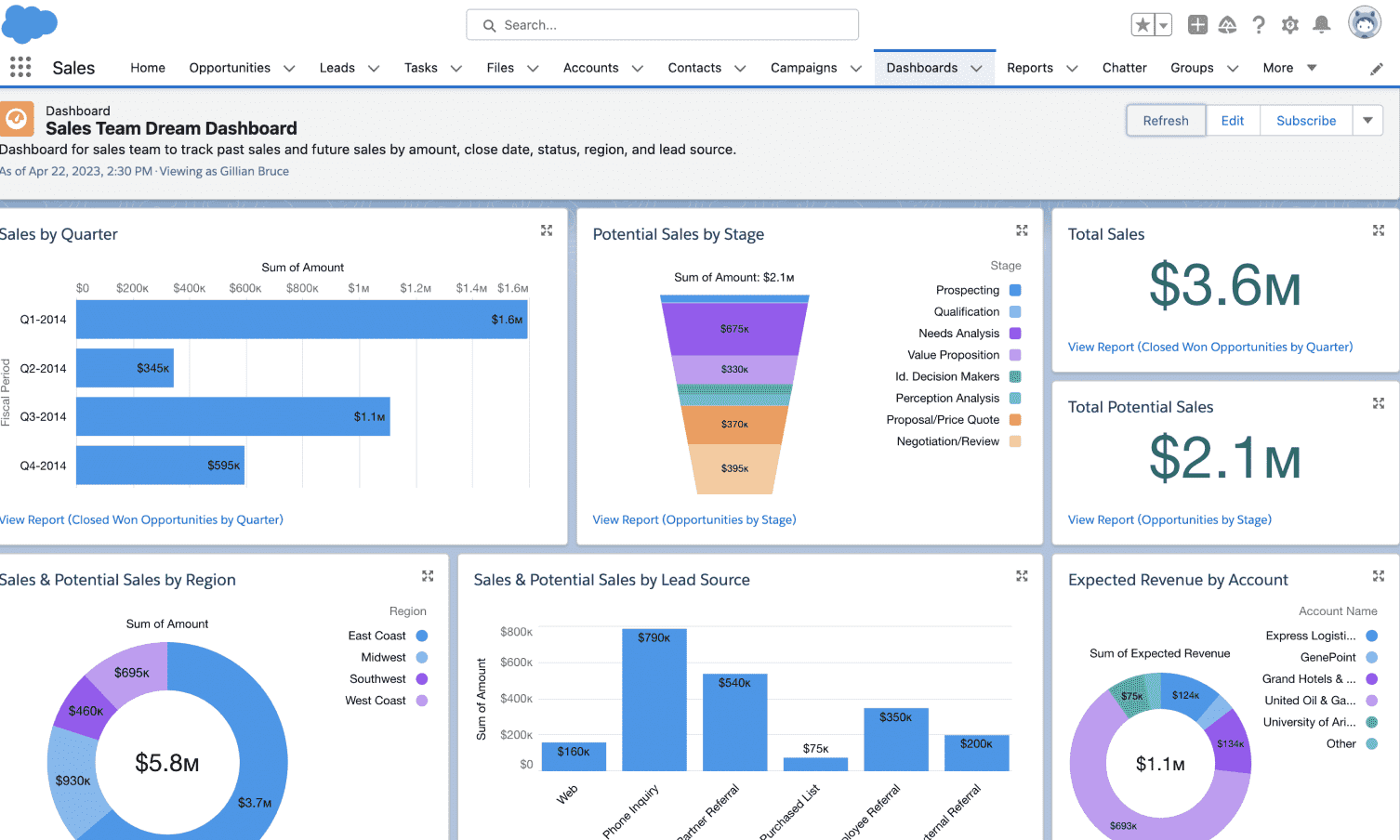
Image Source: Salesforce
When I used Salesforce, I found it to be an incredibly effective CRM platform that catered well to the intricate needs of large sales teams. Its customizable dashboards provided real-time insights into sales pipelines, helping me to monitor progress and make informed decisions.
The automation features streamlined repetitive tasks, freeing up more time to focus on strategic initiatives. Additionally, Salesforce’s Nonprofit Cloud was quite helpful for managing donor relationships and fundraising campaigns.
It offered tools to track donor interactions, manage events, and analyze fundraising performance, making it one of the best CRM for nonprofit organizations. The platform’s scalability ensured it could grow alongside the organization’s needs, and its integration capabilities allowed for seamless connection with other essential tools.
Pros:
- Comprehensive fundraising management tools to manage donor relationships, track contributions, and plan campaigns
- Program management features to monitor and evaluate program effectiveness
- Mobile app for accessing data on the go to help you stay connected to essential insights
- Customizable dashboards and reports to tailor views and insights to fit your specific needs
Cons:
- Customer support can sometimes be inconsistent, which may lead to delays in resolving urgent issues
- Occasional slow performance can delay workflows and interrupt the user experience, affecting productivity during peak times
Pricing:
Starts at $25/user/month.
3. DonorPerfect – Best for Fundraising
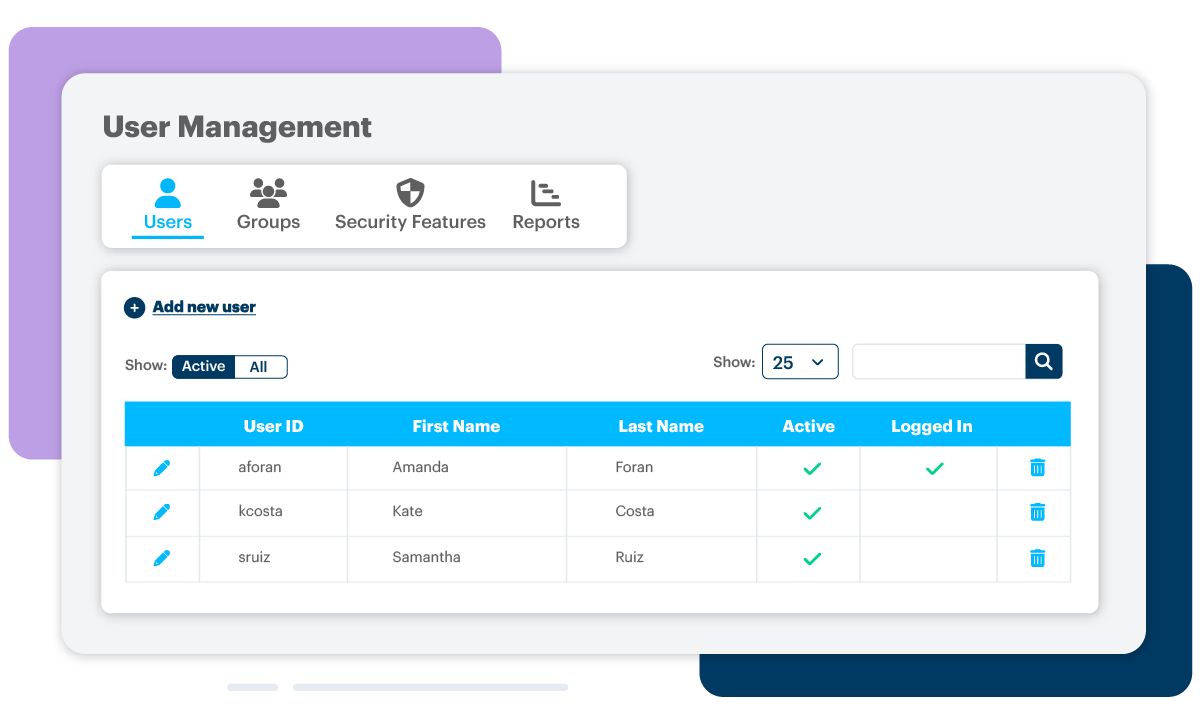
Image Source: DonorPerfect
DonorPerfect offers a comprehensive solution for managing donor relationships and fundraising campaigns. The donor management system kept all supporter details in one place, making it easy to track interactions and personalize outreach. With built-in email marketing powered by Constant Contact, sending targeted fundraising emails became seamless.
The platform also supported customizable online donation forms, helping nonprofits to capture donor data and process payments securely. Automated receipts and acknowledgment letters saved time while keeping donors engaged. Reporting and analytics tools provided in-depth insights into campaign performance, helping optimize fundraising strategies.
As a nonprofit CRM, DonorPerfect handled pledges, event management, and donor segmentation. The ability to set up recurring gifts encouraged long-term donor retention, while integration with third-party apps expanded its capabilities. The mobile access feature was also helpful, making it possible to manage donor data on the go.
Pros:
- Automated workflows to reduce manual effort with built-in automation for tasks like donation tracking and follow-ups
- Integrated payment processing to simplify the process and reduce errors
- Comprehensive fundraising tools, including recurring donations and crowdfunding
- Customizable reports to generate detailed reports tailored to your nonprofit’s specific needs
Cons:
- Some users report a dated user interface
- Data imports may sometimes require additional assistance
Pricing:
Custom pricing.
4. Donorbox CRM – Best for Donor Management
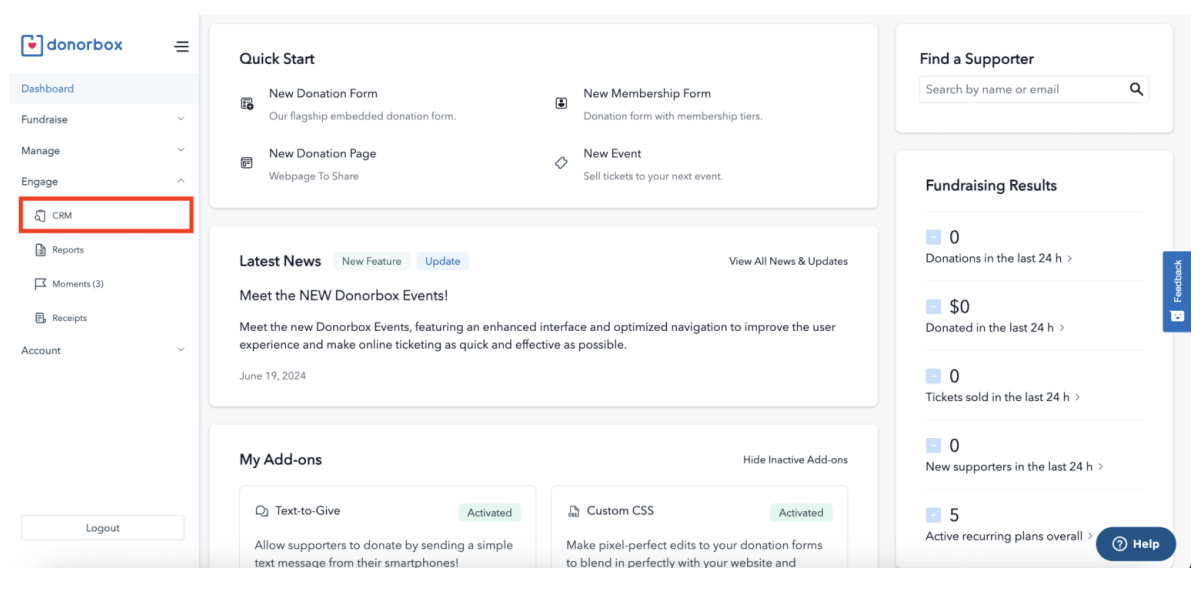
Image Source: Donorbox
Powered by AI, Donorbox CRM served as an all-in-one donor management solution that truly empowered me to strengthen relationships with donors and boost our fundraising efforts. The built-in Mail Center was truly helpful for my team, allowing us to stay on top of all donor communications without ever needing to leave the platform.
What stood out even more were the advanced segmentation tools. They made it incredibly easy to target the right donors at the right time, increasing the impact of our outreach. I was able to effortlessly track donor information, craft personalized outreach materials using AI, and analyze the effectiveness of our fundraising campaigns—all in one place.
Additionally, Donorbox’s intuitive fundraising suite provided detailed insights that helped me make data-driven decisions. I could optimize strategies, identify key opportunities for growth, and nurture long-term donor relationships. It made managing our fundraising operations not only efficient but also impactful.
Pros:
- Built-in Mail Center to help connect multiple Gmail or Outlook accounts making it easy to send, track, and manage emails directly within the platform
- Dynamic Lists to automatically group every contact that meets your predetermined set of criteria
- Moments feature to transform key donor actions and events into impactful outreach opportunities for timely, personalized engagement
- Effective segmentation for maximized outreach potential and more effective campaigns
Cons:
- When emailing a group via the Mail Center, accounts linked to Google and Outlook have limits on the number of recipients that can be included at once
- While Donorbox offers a range of features, its customization options may be limited
Pricing:
Starts at $139/month.
5. Bloomerang – Best for Donor Retention
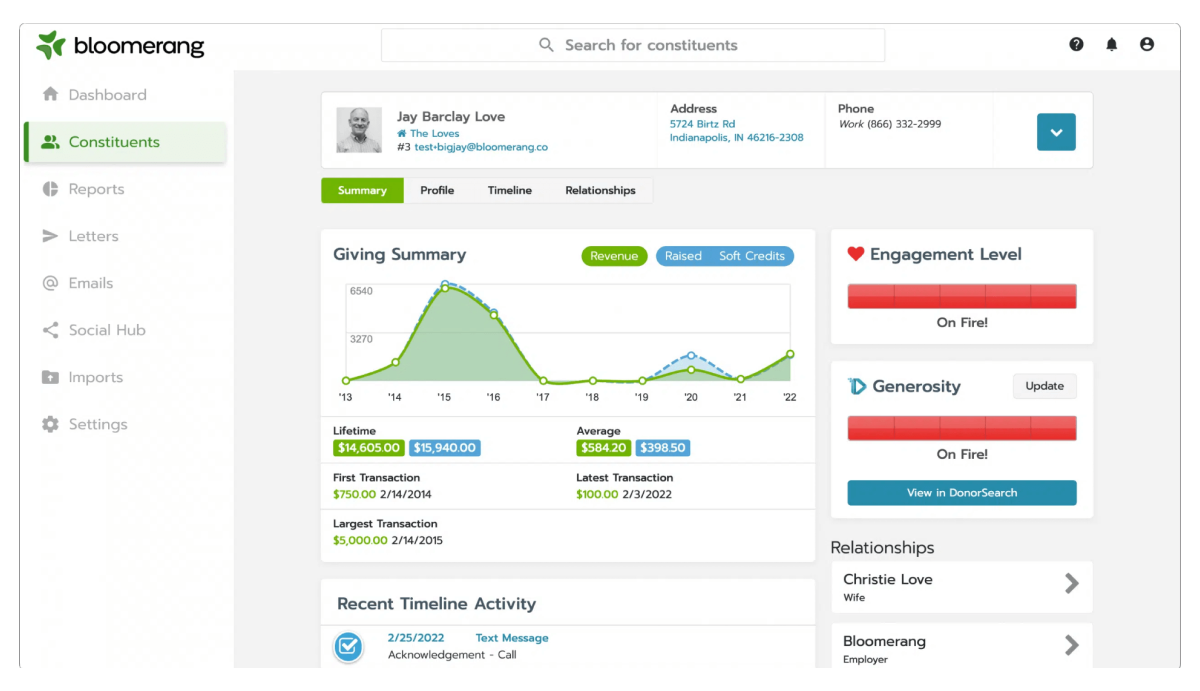
Image Source: Bloomerang
Bloomerang stood out as a user-friendly donor management system designed specifically for nonprofits. Its intuitive dashboard provided real-time insights into donor engagement, allowing me to monitor interactions and identify opportunities to strengthen relationships.
The built-in email marketing tools made it easy to create personalized campaigns, which helped in keeping our supporters informed and connected. Additionally, Bloomerang’s constituent timeline feature offered a comprehensive view of each donor’s history, enabling tailored communication strategies.
These features contributed to making Bloomerang one of the best CRM for nonprofits, as it effectively addressed the unique challenges of donor retention and engagement.
Pros:
- Real-time engagement tracking to monitor donor interactions as they happen, allowing for timely and relevant follow-ups
- Online Giving Forms to create and customize donation forms that integrate seamlessly with your website, simplifying the giving process for donors
- Customizable reporting to generate reports tailored to your organization’s specific needs, providing valuable insights into fundraising performance
- In-built payment processor to maximize your fundraising effortlessly
Cons:
- The email formatting and personalization options may be limited
- Onboarding and initial setup may be time-consuming
Pricing:
Starts at $25/user/month.
6. EngageBay – Best for Lead Generation & Marketing
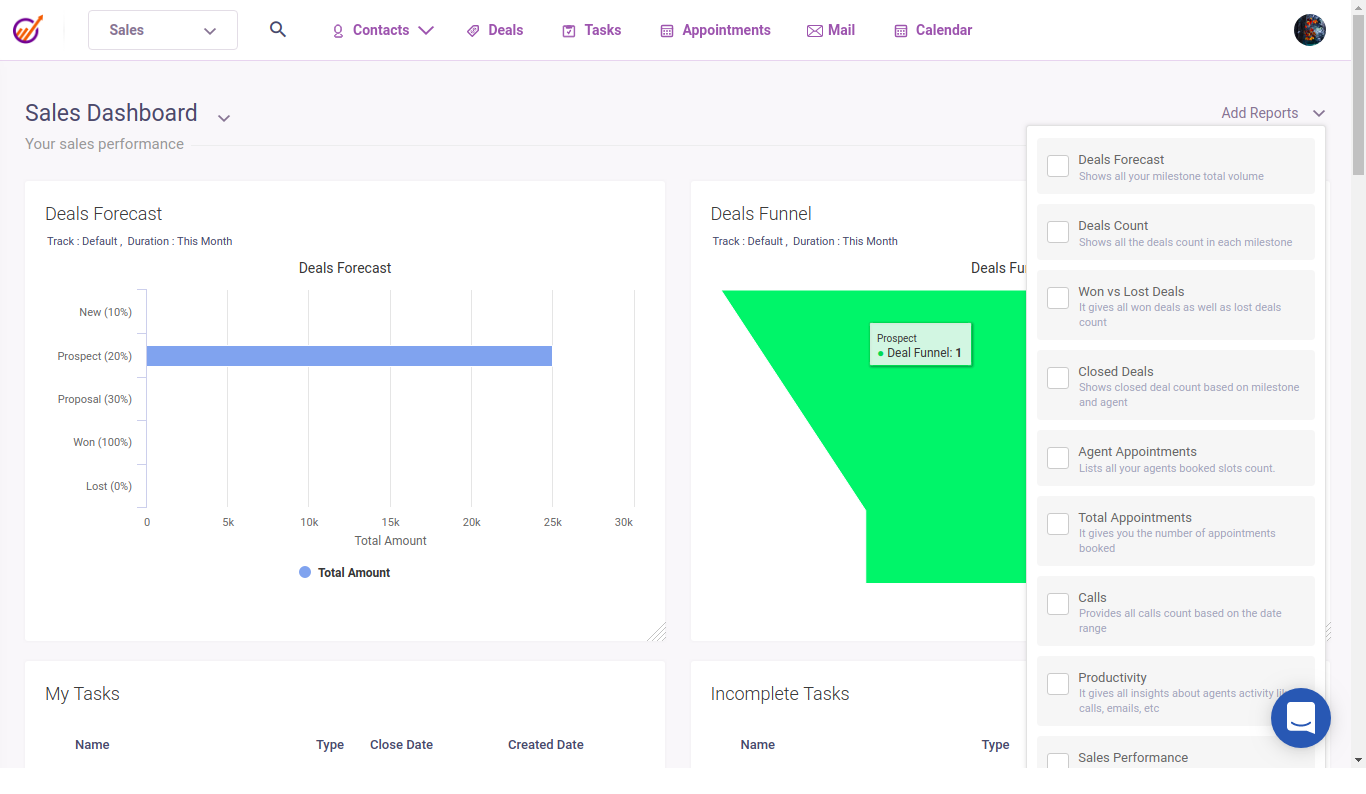
Image Source: EngageBay
EngageBay served as a comprehensive solution for managing donor relationships and streamlining marketing campaigns. Its user-friendly interface helped me to efficiently organize contacts and track interactions, ensuring personalized communication with our supporters.
The marketing automation tools enabled us to design and execute targeted email campaigns, which significantly improved our outreach efforts. Additionally, the customizable landing pages and web forms facilitated effective lead capture, helping us expand our donor base.
The built-in CRM provided a holistic view of our donor interactions, making it easier to manage and nurture relationships. These features made EngageBay a strong contender among suitable CRM for nonprofits, as it effectively addressed our needs for donor management and marketing automation.
Pros:
- Drag-and-drop email builder to easily design and customize email campaigns without any coding knowledge
- Live chat & Helpdesk features to provide real-time assistance to donors or event attendees, improving communication and support
- Task & appointment scheduling to automate reminders and manage meetings with potential donors or volunteers efficiently
- Custom deal pipelines to track fundraising progress, donor pledges, and sponsorship deals in an organized visual pipeline
Cons:
- The drag-and-drop email templates offer fewer customization options compared to other platforms
- A handful of users report that the mobile app experience is limited
Pricing:
Starts at $12.7/user/month.
7. Blackbaud CRM – Best for Fundraising for Enterprise-Scale Nonprofits
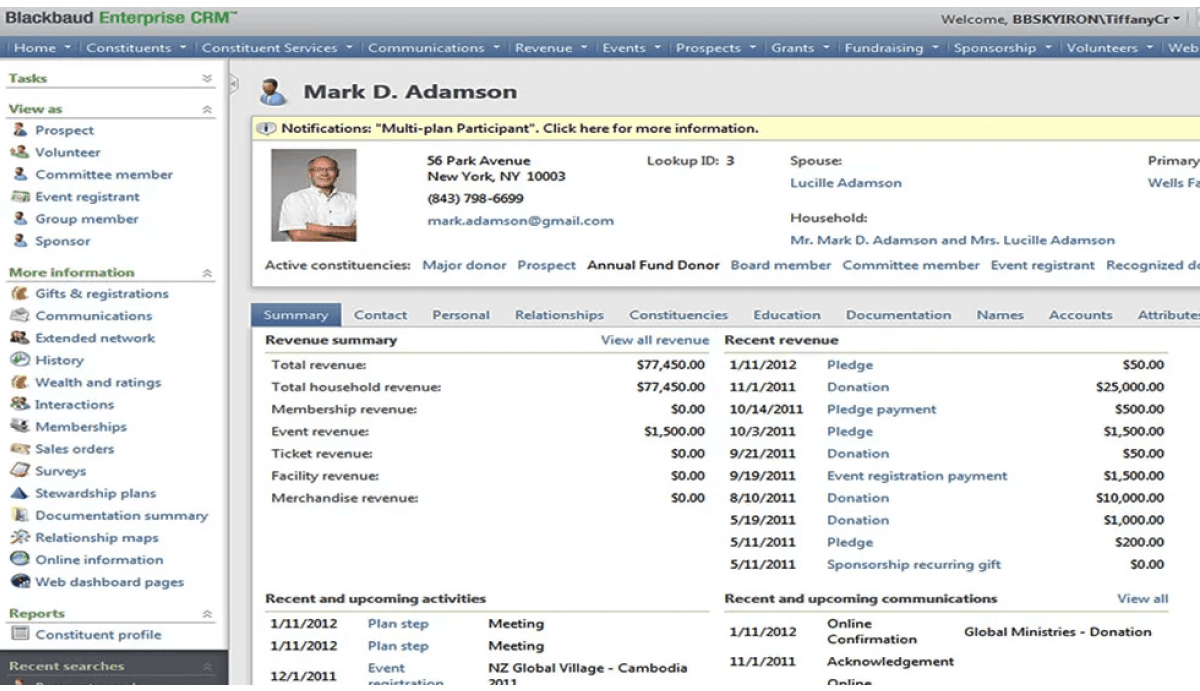
Image Source: Reviano
For large-scale nonprofits that have a distinct set of donors and need to engage with them through multiple channels, my top recommendation would be Blackbaud CRM.
This platform combines CRM functionality with a diverse range of fundraising programs, providing an all-inclusive solution to manage events, volunteers, memberships, and more.
Blackbaud CRM unlocks the potential for increased funding and operational efficiency with flexible moves management and robust stewardship features. Plus, its business intelligence and data analytics capabilities make it a powerful addition to the tech stack of an enterprise-scale nonprofit.
Pros:
- Extensible fundraising data model for accurate tracking and recognition of donors
- Open industry-standard REST APIs for developing tailored applications and extensions
- Duplication management and data enrichment keep your database clean and usable at all times
- Revenue management features like automated receipting, end-to-end card processing, and more
Cons:
- The platform can be challenging to learn and requires significant training
- The high cost of implementation and ongoing service fees might be prohibitive for smaller non-profits
Pricing:
Custom pricing.
8. Neon CRM – Best for Supporter Management for Small to Mid-Sized Nonprofits
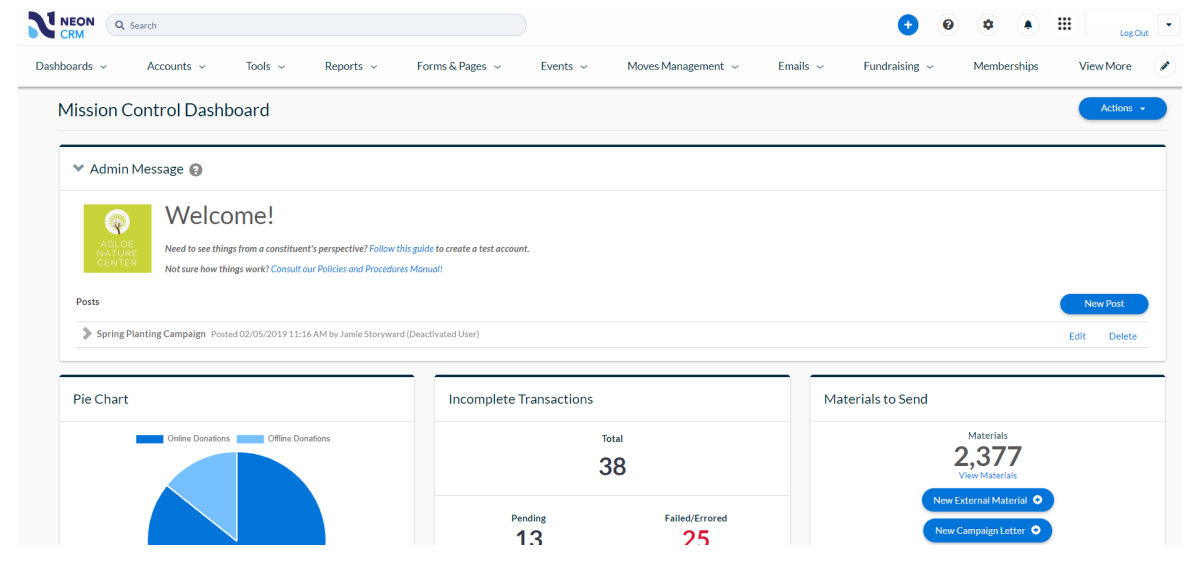
Image Source: Neon One
The next tool on my list of the best CRM for nonprofit organizations is Neon CRM. Offering donor and membership management, e-mail marketing, and event registration, it provides an ecosystem that fosters deep and meaningful relationships with constituents and supporters across digital platforms.
Neon CRM also integrates with industry-standard tools like Quickbooks, Constant Contact, and Mailchimp, ensuring that all of your systems speak to each other seamlessly.
I found the workflow automation capabilities of this client management software for nonprofits to be extremely valuable for improving my team’s operational efficiency. Plus, the smart deduplication kept my database free of redundancies.
Pros:
- Integrations with third-party payment gateways to ease financial account management
- Insightful dashboards for real-time data visualization and metrics tracking
- Automated membership renewals and notifications to decrease manual work
- Generates comprehensive reports for donor activity and contributions
Cons:
- The user interface might feel less intuitive for inexperienced users
- The system can struggle with speed when handling larger data sets
Pricing:
Starts at $99/month.
9. Keela – Best for Collaborative Teamwork & Stakeholder Engagement
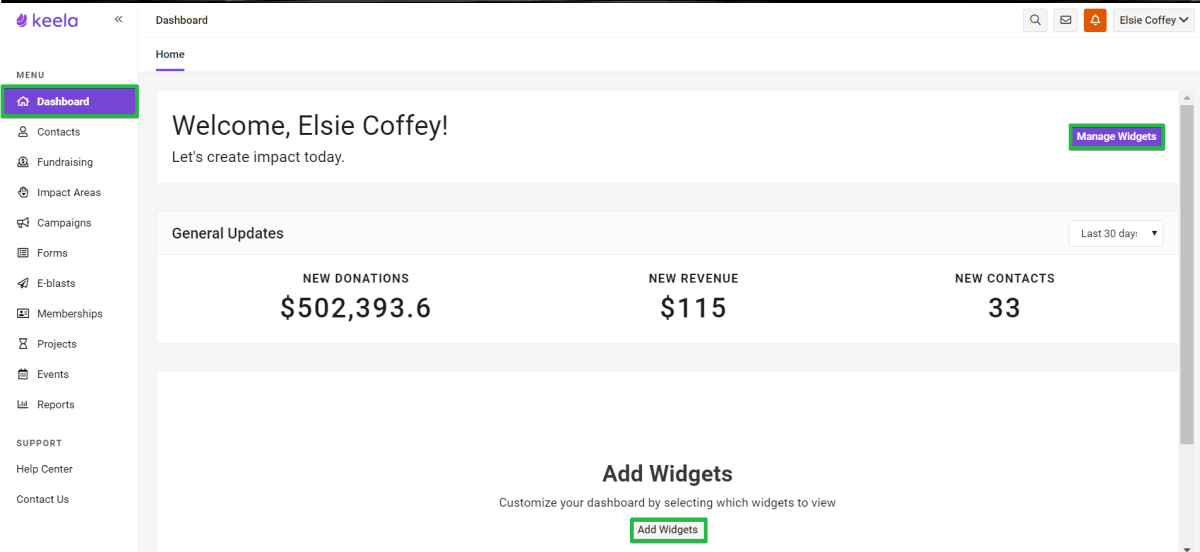
Image Source: Keela Help Center
For nonprofit organizations that are in search of a fundraising tool that also enhances their team’s productivity and collaboration, I would recommend giving Keela a go.
Whether it is donor management, email marketing, fundraising, or effective reporting, Keela does it all while keeping the process manageable and straightforward. It simplifies donor and contact management, supported by intelligent tools that provide actionable insights.
Keela is also a reliable option to run multiple fundraising campaigns simultaneously. I found the tool’s ability to bring data from multiple sources and present it as detailed reports to be quite impressive.
Pros:
- Rich contact profiling for extensive visibility into donor information
- Easy creation and execution of email marketing campaigns
- Intuitive project management tools for effortless team coordination
- Smart automation features to streamline recurring tasks
Cons:
- Certain important features like automation and wealth screening may require an upgraded, pricier subscription
- The reporting interface may not be as detailed as provided by some competitors
Pricing:
Custom pricing.
10. GiveButter – Best for Online Fundraising
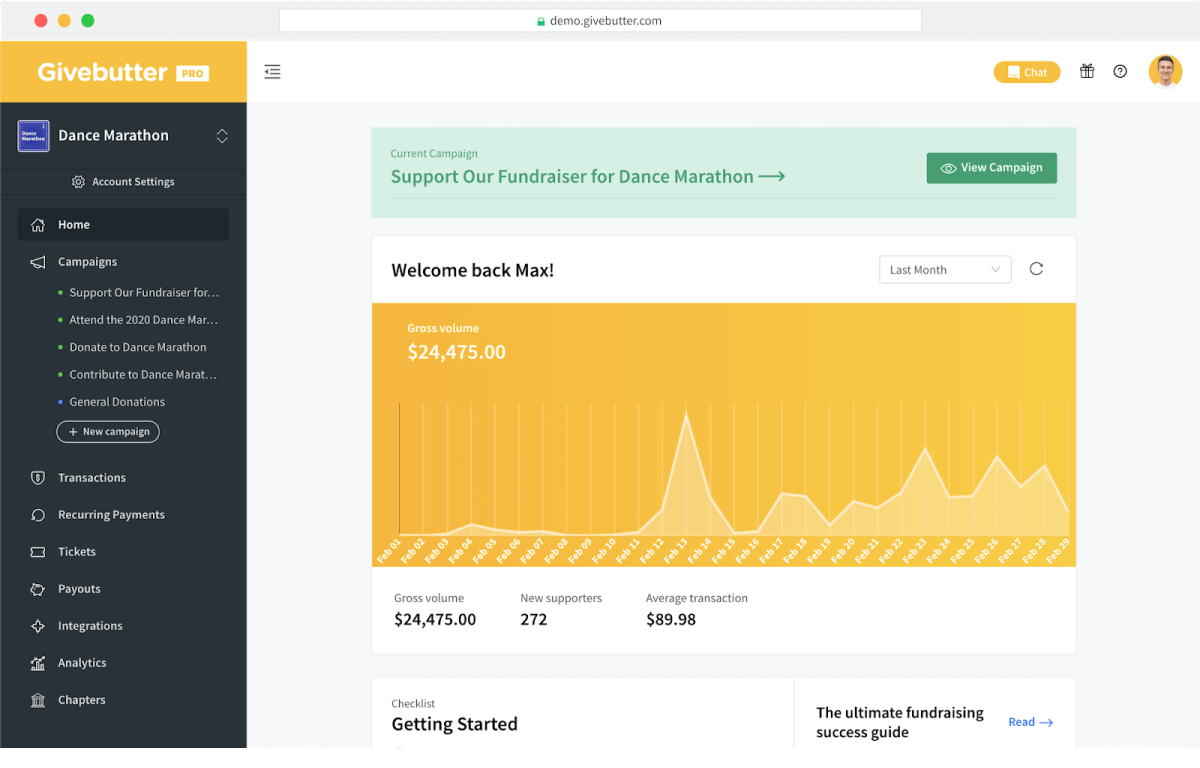
Image Source: GiveButter Blog
As a one-stop, free fundraising CRM platform, GiveButter can help you raise more funds while paying less.
It offers several avenues for fundraising, including donations, events, and team/peer-to-peer fundraising. You can create attractive, engaging fundraising pages with rich media, social integrations, and dynamic donor walls.
Adding to its benefits is the dashboard for tracking real-time campaign progress and donor engagement. I also like that it lets you build segmented lists for donors, which helps target specific groups with personalized and automated messaging.
Pros:
- Real-time tracking and reporting on all donation-related activities
- Flexible and engaging fundraising pages for donor attraction
- Transaction history with options for refunds and recurring donations
- Automated emails and receipts to keep track of the donations made
Cons:
- Automatic updates and changes to the system can be confusing and disruptive
- Limited customization of email receipts may lead to less personalized donor communication
Pricing:
Starts at $29/month.
Features to Look for in a Nonprofit CRM
Choosing the right CRM for your nonprofit can make a huge difference in managing donors, tracking donations, and running campaigns smoothly. The right features help you save time, engage supporters, and grow your impact. If you’re wondering what is the best CRM for nonprofits, here are the key features to look for:
1. Donor Management
A nonprofit CRM should act as a central database for all donor information. It should store names, contact details, donation history, engagement levels, and past interactions. This makes it easy to segment donors, personalize outreach, and build long-term relationships with supporters. Some CRMs also offer donor engagement scores to help you identify your most loyal contributors.
2. Fundraising & Donation Tracking
Tracking donations is crucial for financial transparency and campaign success. A good CRM should allow you to monitor donor contributions in real-time, process one-time and recurring donations, and generate reports to analyze trends. Some platforms also include automated reminders for pledges to encourage consistent giving.
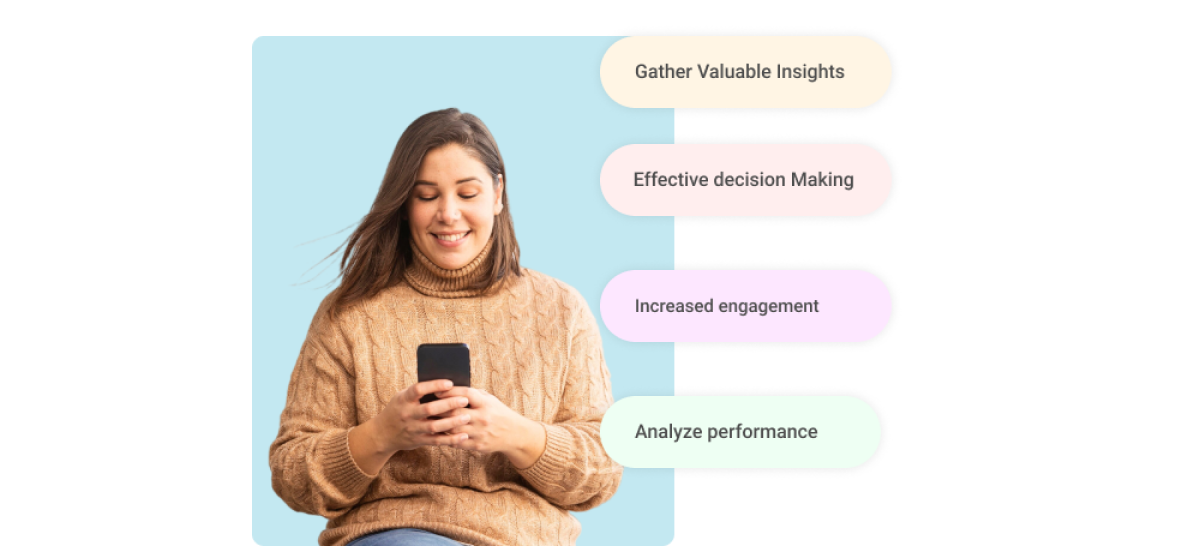
3. Email & Communication Automation
Manually sending emails to donors can be time-consuming. Look for a CRM with built-in automation that can send personalized thank-you emails, event invitations, and fundraising appeals. Drip campaigns and scheduled follow-ups help keep supporters engaged without extra effort on your part.
4. Event Management
If your nonprofit hosts fundraisers, awareness programs, or networking events, having an event management feature in your CRM is truly helpful. It should help you create and manage event registrations, send reminders, track attendance, and even collect donations during events. Some CRMs also allow you to integrate event data with donor profiles for better engagement tracking.
5. Grant & Pledge Tracking
Nonprofits often rely on grants and donor pledges for funding. A CRM should help track grant applications, submission deadlines, and funding progress. It should also allow you to manage donor pledges by sending reminders and tracking partial payments, ensuring no funding opportunity slips through the cracks.
6. Volunteer Management
For nonprofits that rely on volunteers, a CRM should offer tools to manage schedules, assign roles, and track hours. Some platforms even allow you to segment volunteers based on skills or interests, making it easier to match them with relevant opportunities. Keeping volunteers engaged can lead to long-term advocacy for your cause.
7. Customizable Online Donation Forms
A CRM should offer easy-to-build online donation forms that match your branding. These forms should integrate with your website, allowing donors to give directly through a secure portal. Features like suggested donation amounts, recurring donation options, and mobile-friendly design can enhance the donor experience.
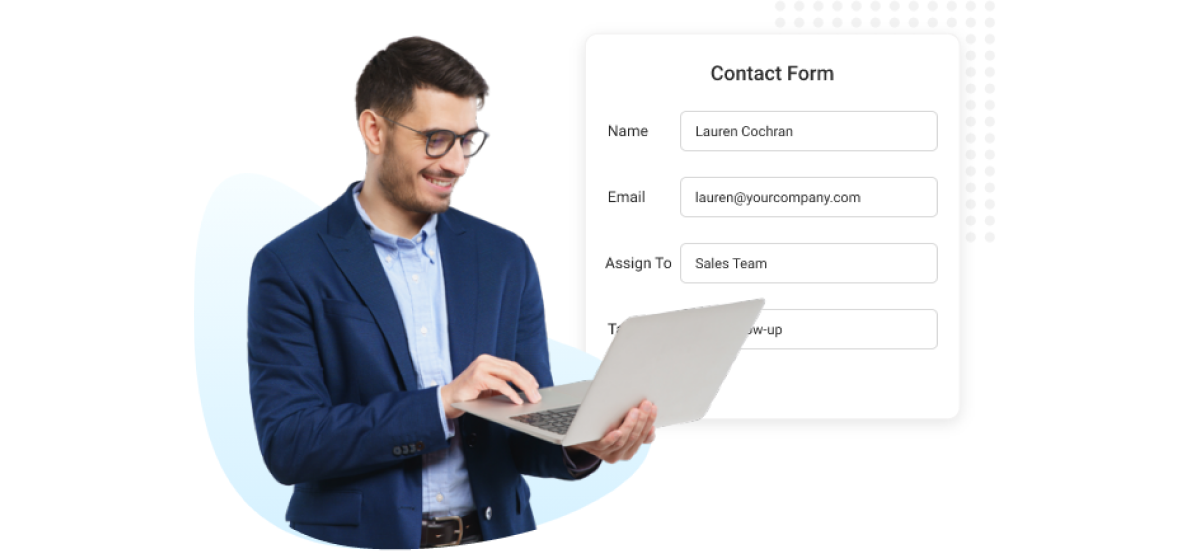
8. Mobile Accessibility
Nonprofit teams often work remotely or attend events where they need quick access to donor information. A CRM with mobile accessibility allows you to update donor records, track donations, and manage fundraising activities from anywhere. This ensures real-time data entry and on-the-go donor engagement.
While nonprofit CRMs emphasize donor and volunteer tracking, other industries prioritize policy management or lead pipelines. For example, CRMs for Insurance Agents focus on client follow-ups, renewals, and productivity tools tailored for financial services.
Steps to Find and Implement the Right Nonprofit CRM for Your Needs
Finding the perfect nonprofit CRM isn’t just about picking a tool—it’s about ensuring it fits your organization’s unique needs. To find the best CRM software for nonprofits, follow these steps:
Step 1: Identify Your Organization’s Needs
Start by listing what you need in a CRM. Do you need donor tracking, event management, or automated email campaigns? Understanding your must-have features will help narrow down your options.
Step 2: Set a Budget
Nonprofit CRMs come with different pricing models, including free, subscription-based, and pay-per-feature options. Consider your budget, but also think about long-term value—sometimes investing a little more gets you better automation and insights.
Step 3: Research and Compare CRMs
Look at different CRM platforms and compare their features. Read reviews, check case studies, and explore free trials to see how user-friendly they are. Pay attention to customer support and ease of customization.
Step 4: Ensure It Integrates with Existing Tools
Your CRM should connect with tools you already use, like email marketing platforms, accounting software, and donation processors. Seamless integration prevents data silos and saves you from manual data entry.
Step 5: Test with a Free Trial or Demo
Most CRM providers offer free trials or demos. Take advantage of these to test the software’s features, ease of use, and customization options. Involve your team in testing to get their feedback.
By following these steps, you’ll find a CRM that not only fits your organization but also helps you manage donors and fundraising more efficiently.
Pro Tip: If you’re just starting out or on a tight budget, try a free plan from a trusted platform like BIGContacts. It offers solid functionality for small teams and gives you room to grow as your donor base expands.
Find the Best CRM for Your Non-Profit Organization
Choosing the right CRM for Nonprofits is essential for managing donor relationships, tracking fundraising efforts, and streamlining daily tasks. A well-designed CRM can automate communications, segment donors for targeted outreach, and provide real-time insights into supporter engagement.
The key is to find a system that fits your nonprofit’s specific needs—whether it’s event management, grant tracking, or volunteer coordination. While there are many options available, look for a CRM that is user-friendly, integrates with your existing tools, and scales as your organization grows.
Cost is also a crucial factor, especially for smaller nonprofits operating on tight budgets. BIGContacts CRM is one solution worth considering, offering a balance of functionality and affordability. Plus, with its forever free plan, it provides nonprofits with an accessible way to manage donor relationships without upfront costs.
Different industries require different tools. If you’re in retail or online sales, don’t miss our curated list of the Top e-commerce CRM Platforms built to scale customer operations and sales pipelines.
Frequently Asked Questions
What is the best CRM for nonprofits?
It depends on your nonprofit’s size, budget, and goals. For small teams looking for affordability and ease of use, BIGContacts is a top choice. Larger organizations with complex fundraising operations may benefit more from platforms like Salesforce or DonorPerfect, which offer advanced features and scalability.
How much does a nonprofit CRM cost?
Pricing varies widely. Some CRMs like BIGContacts or GiveButter offer free plans for small teams, while others charge anywhere from $10 to $100+ per user/month. Many platforms also provide custom pricing based on features, modules, or the number of contacts.
How does a CRM for nonprofits work?
A nonprofit CRM functions as a centralized hub for all your supporter data. It records donor interactions, tracks contributions, automates communications, manages events and volunteers, and generates performance reports. This integrated system helps your team stay organized and responsive.
What are the benefits of nonprofit CRMs?
Nonprofit CRMs improve efficiency, donor engagement, and fundraising outcomes. They help organize supporter information, automate outreach, simplify event and volunteer management, and provide actionable insights. In short, they reduce manual work while increasing your nonprofit’s capacity to grow and retain support.
FREE. All Features. FOREVER!
Try our Forever FREE account with all premium features!





